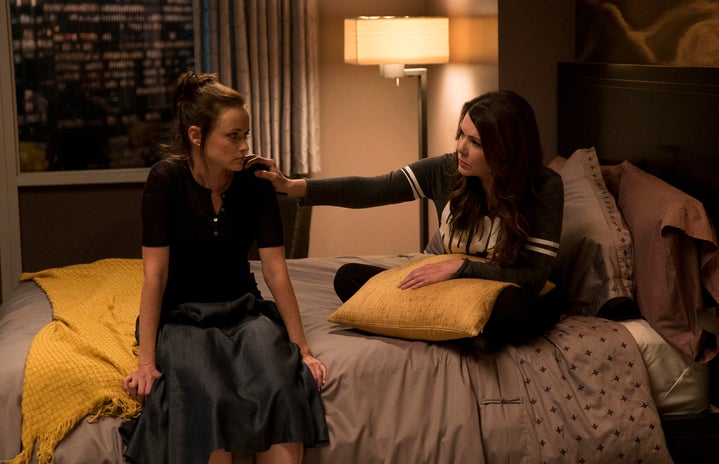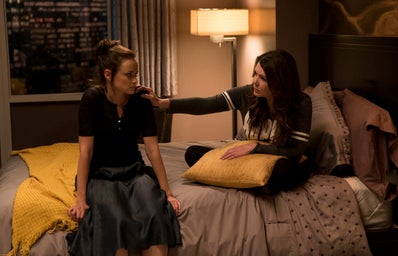Set in the fictional town of Stars Hollow, Amy Sherman-Palladino’s 2000s comfort classic Gilmore Girls’ seven seasons follow the lives of mother-daughter duo Lorelai (played by Lauren Graham) and Rory Gilmore (Alexis Bledel) and their explorations in love, friendship and the eccentricities of small-town life. Since moving to Nottingham, not a single ounce of stress or anxiety hasn’t been cured by me curling up in bed and switching on Gilmore Girls. I am so soothed by the sound of the first few lines of Carole King’s Where You Lead (the show’s theme song) that you could possibly argue that my reliance on the show to stabilise my mental wellbeing is probably a bit unhealthy. But, alas, it has become the crux on which I depend; it filled the inevitable lonely hours of first-year with a sense of home, and I’ve since grown an intense attachment to it, and with that, an intense attachment to its characters.
There are quite a few mutual understandings when it comes to being a Gilmore Girls devotee. You are meant to wholeheartedly agree that Luke and Lorelai are meant to be together, that it doesn’t matter whether you are Team Dean, Jess or Logan for Rory as long as you agree that Dave Rygalski (Lane’s boyfriend in Season 3) is better than all of them put together, and that Rory’s character is never the same the second she goes to Yale University and cuts her hair into a bob in Season 4.
In fact, for some fans, the dislike for “Yale Rory” runs so deep that they stop their annual rewatches when Rory graduates high-school at the end of Season 3. For other viewers, Rory is unbearable from the start, and their watching of their show would cease if it were not for their loyal love of Lorelai’s quirky, charming character. Clearly not a fan-favourite, the hatred for Rory has amassed outside of fan circles, where, back in 2016, even the Washington Post called her a “monster” and Vice labelled her as the “worst”.
Perhaps this hatred is understandable – Rory does make her fair share of mistakes. Whether it’s the stealing of the yacht with Logan, dropping out of Yale at the first hurdle or sleeping with her now married ex-boyfriend Dean, Rory can be impulsive and selfish, and is often accused of not having a backbone or that she plays the victim too much. But she’s also just a teenager.
We are introduced to Rory when she is sixteen-years-old. She’s the all-round, squeaky-clean and faultless American “good girl”, so much so that a recent term has emerged called the “Rory Gilmore Syndrome” that refers to the pressure that arises at the need to live up to such perfection. Rory appears to us as a child prodigy – she’s adorably naive, she prioritises school and gets perfect grades, she’s kind and sweet to those around her and she rarely, if ever, steps a toe out of line. By being pretty much perfect from the get-go, not only do the characters of the show – namely Lorelai, and her grandparents Emily and Richard Gilmore – expect nothing but perfection from her, but as viewers, we do too. We rely on Rory to portray to us the pretty picture of the “good girl” ideal, and crucify her the moment the image falters and she becomes human.
To some fans, the difference between “Chilton Rory” (Chilton referring to Rory’s private school) in Seasons 1, 2 and 3 and “Yale Rory” in Seasons 4, 5, 6 and 7 is like watching two different characters. She goes from an innocent, faultless teenager, to an insecure, messy young adult. But to me, her eventual failures and mistakes not only make sense, but they are realistic. Rory crumbles under the weight of perfectionism laid down on her by her family and most significantly, the pressure that she places on herself to over-achieve and live up to expectation. And she simply burns out.
I am not sure what this says about me when I say this, but Rory is one of few characters from film and TV that I truly resonate with. Like Rory, I too have made mistakes that my sixteen-year-old self wouldn’t comprehend. Like Rory, I grew up with the “gifted kid” label that has only led me to feel enormous amounts of pressure to live up to such a label. Like Rory, I thrive off of academic validation, a large portion of my self-worth defined by my educational achievement that, after I graduate in July, will no longer be fulfilled once I hit the “real” world.
I am an anomaly when it comes to the Rory Gilmore antagonisation. Perhaps it is my loyal attachment to the show that has caused me to have such a soft spot for her that refuses to budge, or perhaps it’s that I can see too much of myself in her for me to be able to write her off completely. But if anything, Rory teaches us the price of pursuing perfection, and that we should allow ourselves some breathing room to mess up every once in a while. I can certainly think of other characters within Gilmore Girls who much more rightly deserve to face the brunt of the hatred that Rory receives – there’s no one worse than Rory’s father, Christopher!
Set in the fictional town of Stars Hollow, Amy Sherman-Palladino’s 2000s comfort classic Gilmore Girls’ seven seasons follow the lives of mother-daughter duo Lorelai (played by Lauren Graham) and Rory Gilmore (Alexis Bledel) and their explorations in love, friendship and the eccentricities of small-town life. Since moving to Nottingham, not a single ounce of stress or anxiety hasn’t been cured by me curling up in bed and switching on Gilmore Girls. I am so soothed by the sound of the first few lines of Carole King’s Where You Lead (the show’s theme song) that you could possibly argue that my reliance on the show to stabilise my mental wellbeing is probably a bit unhealthy. But, alas, it has become the crux on which I depend; it filled the inevitable lonely hours of first-year with a sense of home, and I’ve since grown an intense attachment to it, and with that, an intense attachment to its characters.
There are quite a few mutual understandings when it comes to being a Gilmore Girls devotee. You are meant to wholeheartedly agree that Luke and Lorelai are meant to be together, that it doesn’t matter whether you are Team Dean, Jess or Logan for Rory as long as you agree that Dave Rygalski (Lane’s boyfriend in Season 3) is better than all of them put together, and that Rory’s character is never the same the second she goes to Yale University and cuts her hair into a bob in Season 4.
In fact, for some fans, the dislike for “Yale Rory” runs so deep that they stop their annual rewatches when Rory graduates high-school at the end of Season 3. For other viewers, Rory is unbearable from the start, and their watching of their show would cease if it were not for their loyal love of Lorelai’s quirky, charming character. Clearly not a fan-favourite, the hatred for Rory has amassed outside of fan circles, where, back in 2016, even the Washington Post called her a “monster” and Vice labelled her as the “worst”.
Perhaps this hatred is understandable – Rory does make her fair share of mistakes. Whether it’s the stealing of the yacht with Logan, dropping out of Yale at the first hurdle or sleeping with her now married ex-boyfriend Dean, Rory can be impulsive and selfish, and is often accused of not having a backbone or that she plays the victim too much. But she’s also just a teenager.
We are introduced to Rory when she is sixteen-years-old. She’s the all-round, squeaky-clean and faultless American “good girl”, so much so that a recent term has emerged called the “Rory Gilmore Syndrome” that refers to the pressure that arises at the need to live up to such perfection. Rory appears to us as a child prodigy – she’s adorably naive, she prioritises school and gets perfect grades, she’s kind and sweet to those around her and she rarely, if ever, steps a toe out of line. By being pretty much perfect from the get-go, not only do the characters of the show – namely Lorelai, and her grandparents Emily and Richard Gilmore – expect nothing but perfection from her, but as viewers, we do too. We rely on Rory to portray to us the pretty picture of the “good girl” ideal, and crucify her the moment the image falters and she becomes human.
To some fans, the difference between “Chilton Rory” (Chilton referring to Rory’s private school) in Seasons 1, 2 and 3 and “Yale Rory” in Seasons 4, 5, 6 and 7 is like watching two different characters. She goes from an innocent, faultless teenager, to an insecure, messy young adult. But to me, her eventual failures and mistakes not only make sense, but they are realistic. Rory crumbles under the weight of perfectionism laid down on her by her family and most significantly, the pressure that she places on herself to over-achieve and live up to expectation. And she simply burns out.
I am not sure what this says about me when I say this, but Rory is one of few characters from film and TV that I truly resonate with. Like Rory, I too have made mistakes that my sixteen-year-old self wouldn’t comprehend. Like Rory, I grew up with the “gifted kid” label that has only led me to feel enormous amounts of pressure to live up to such a label. Like Rory, I thrive off of academic validation, a large portion of my self-worth defined by my educational achievement that, after I graduate in July, will no longer be fulfilled once I hit the “real” world.
I am an anomaly when it comes to the Rory Gilmore antagonisation. Perhaps it is my loyal attachment to the show that has caused me to have such a soft spot for her that refuses to budge, or perhaps it’s that I can see too much of myself in her for me to be able to write her off completely. But if anything, Rory teaches us the price of pursuing perfection, and that we should allow ourselves some breathing room to mess up every once in a while. I can certainly think of other characters within Gilmore Girls who much more rightly deserve to face the brunt of the hatred that Rory receives – there’s no one worse than Rory’s father, Christopher!


